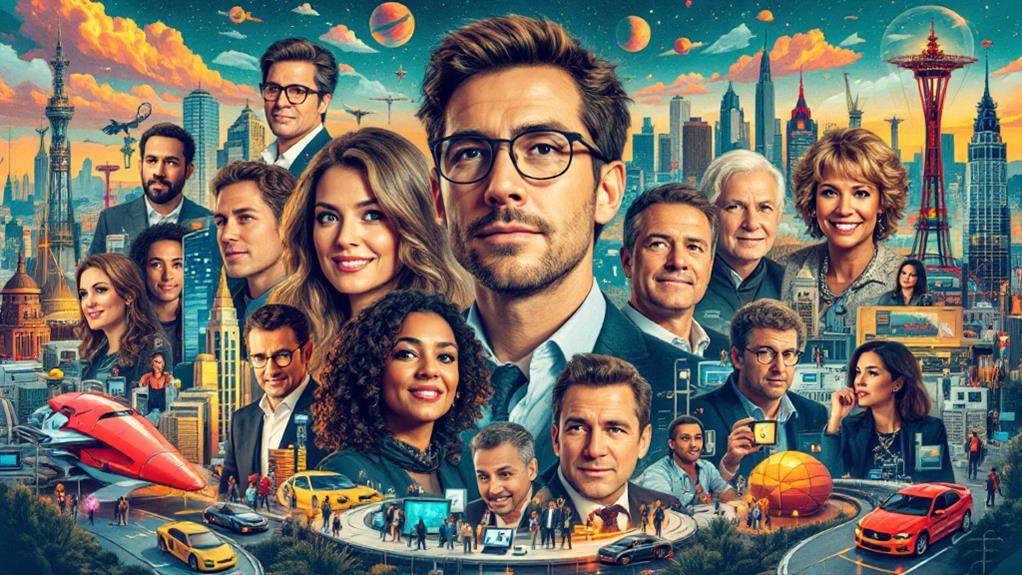Meet the World’s Youngest Self-Made Billionaires

Meet some of the world's youngest self-made billionaires who have reshaped their industries with groundbreaking innovation. You've got Gary Wang, who co-founded FTX and experienced ups and downs in cryptocurrency. See how Palmer Luckey sold Oculus VR to Facebook, bolstering his fortune. Follow Ben Francis as he turned Gymshark into a $1.45 billion sportswear giant. Uncover how Andy Fang and Stanley Tang made DoorDash a staple in food delivery. These billionaires' stories highlight the power of technology in generating immense wealth. There's much more to reveal about their inspiring paths and the challenges they've overcome.
Profiles of Young Innovators
Although many aspire to make their mark in the business world, few do so as quickly and decisively as today's young innovators. Meet Gary Wang, the youngest self-made billionaire, whose expedition from co-founding FTX, a once-thriving cryptocurrency platform, to seeing his net worth plummet to zero following the company's dramatic bankruptcy, is a proof of the volatile yet pioneering nature of this field.
Then there's Palmer Luckey, whose innovation in tech startups led to founding Oculus VR, later sold to Facebook. At 31, with a net worth of $2.3 billion, he's also making waves in defense technology with Anduril. Likewise, Ben Francis, at the same stage of life, transformed a homegrown sportswear brand, Gymshark, into a $1.45 billion enterprise, showcasing the power of youthful enterprise in the fashion industry.
On the tech frontier, Andy Fang and Stanley Tang, both 31, co-founded DoorDash and propelled it to public markets, each amassing a net worth of $1.2 billion. Their entrepreneurial spirit highlights the impact of innovation in food delivery services. These billionaires under the threshold of 32 illustrate how creativity and drive can shape the future of business.
Industries Transforming Wealth
Driven by rapid technological advancements and shifting consumer demands, certain industries are transforming how wealth is generated. The technology sector, particularly in virtual reality, e-commerce, and food delivery, plays a crucial role in shaping the fortunes of the world's youngest billionaires. Self-made billionaires like Gary Wang and Palmer Luckey illustrate the diverse opportunities within these industries.
Gary Wang, despite FTX's downfall, initially thrived in the e-commerce and cryptocurrency space. His expedition highlights how digital finance can create immense wealth, albeit with risks. On the other hand, Palmer Luckey revolutionized virtual reality with Oculus VR and further expanded into defense technology with Anduril. His ventures demonstrate how innovation in virtual reality can lead to substantial financial success.
In the domain of food delivery, Andy Fang and Stanley Tang of DoorDash have capitalized on the increasing demand for convenient meal solutions, marking their presence as young self-made billionaires. Meanwhile, Ben Francis's Gymshark redefined the sportswear market, merging e-commerce with fitness culture to reach a $1.45 billion valuation.
These industries, driven by technological prowess and consumer-centric strategies, continue to offer promising avenues for young entrepreneurs seeking to build significant wealth.
Challenges in Modern Entrepreneurship

In the current fast-paced business environment, young entrepreneurs face an array of challenges that can greatly impact their ventures. As a young billionaire, you must navigate the stormy seas of market volatility, especially within the technology and cryptocurrency sectors. Rapid changes here can drastically affect your financial stability and business operations. Furthermore, regulatory hurdles are ever-present, requiring you to skillfully maneuver through complex legal landscapes that differ by region and industry.
To maintain relevance, you must deal with intense competition, particularly in the tech and finance sectors. Innovation becomes your ally as you endeavor to differentiate your offerings. The pressure doesn't end there; public scrutiny and heightened media attention contribute another layer of complexity. You're expected to meet societal expectations, which influences your decision-making and personal branding.
Moreover, sustainability is no longer optional. Consumers demand corporate responsibility, urging you to adopt environmentally friendly practices. Here are a few challenges you'll face:
- Market Volatility: Adapt to rapid changes to protect financial stability.
- Regulatory Hurdles: Navigate diverse legal environments effectively.
- Public Scrutiny: Balance societal expectations with personal values.
Confronting these challenges head-on is vital for your entrepreneurial success.
The Role of Technology
Technology is undeniably a cornerstone in the success stories of young self-made billionaires. It allows these visionaries to harness cutting-edge advancements and transform industries. Take Palmer Luckey, for example, who tapped into virtual reality to build a significant fortune. By focusing on innovation, he met evolving consumer demands and established a robust presence in both the tech and defense sectors.
Young billionaires often emerge from technology-driven fields like AI, fintech, and e-commerce. These sectors are hotbeds for wealth generation, offering vast opportunities for those who can anticipate and respond to shifting consumer demands. Andy Fang and Stanley Tang, the brains behind DoorDash, exemplify this by using technology to address the need for convenience in food delivery services.
In social media, Evan Spiegel's success with Snapchat highlights how advancements in mobile technology can lead to lucrative business ventures. His work in this industry underscores the power of tech in crafting new markets and media landscapes.
Additionally, technology's transformative impact on traditional business models is evident in ventures like Ryan Breslow's OYO Rooms. By integrating tech into hospitality, he redefined consumer expectations, further showcasing technology's role in modern wealth accumulation.
Future Wealth Trends

A shift is underway in the landscape of young billionaires, pointing toward a future shaped more by inheritance than innovation. With no self-made billionaires under 30 listed for the inaugural time in 15 years, the world's youngest billionaires are increasingly inheriting their fortunes. This trend is fueled by the great wealth transfer from Baby Boomers, who are set to pass down approximately $95.9 trillion. As a result, future wealth generation seems poised to rely more heavily on family legacies and inherited wealth.
Consider the following future wealth trends:
- Generational Wealth Transfer: The staggering $147.1 trillion U.S. wealth is largely controlled by Baby Boomers, signaling a significant shift towards generational wealth as they pass on their fortunes.
- Inherited Wealth Dominance: The youngest billionaire, 19-year-old Livia Voigt, exemplifies this trend as she holds $1.1 billion from her grandfather's company, WEG, while still in college.
- Affluent Backgrounds: A significant 60% of young European billionaires hail from affluent backgrounds, underscoring the growing reliance on established family businesses over new entrepreneurial ventures.
As you observe these trends, it's clear that family legacies and inherited wealth will play a vital role in shaping the future landscape of global billionaires.




